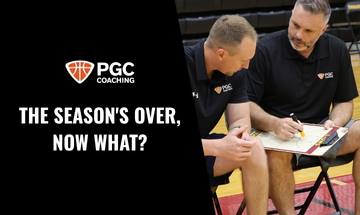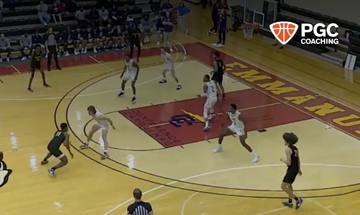How Assistant Coaches Can Add Value: 5 Tracking Tips from the NBA
If you want to be taken seriously as an assistant basketball coach—whether you’re a GA, volunteer, or varsity assistant—start with this: Don’t show up empty-handed.
And before I dive into 5 tracking tips assistant coaches can use from the NBA, here are a couple more resources to check out:
- Master Planning: The Missing Key to Better Practices and a Stronger Season
- How to Execute a Great Basketball Practice
- How to Break Down Game Film as a Coach: A Post-Game Blueprint
What the NBA Teaches Us About Assistant Basketball Coach Preparation
Watch any assistant coach in the NBA on game day, and you’ll notice something right away:
They come prepared.
They’ve got a notebook full of scouting notes, play diagrams, and call sheets. And instead of barking orders from the bench, they’re watching. They’re taking notes. They’re collecting real-time data to serve the team.
Why? Because they understand this truth: Information is currency. And when you bring valuable information, you earn trust.
So, if we’re going to model this example, what exactly should assistant basketball coaches be tracking?
The best place to start is by asking your head coach what would help them most. But here are five categories that consistently make a difference:
- Shot charts (where are we scoring or missing?)
- Hustle stats (charges taken, missed box-outs, 50/50 balls)
- Possession efficiency (points per possession by set or action)
- Matchup notes (are certain players struggling with assignments?)
- Bench energy and focus (who’s locked in, who’s not?)
Be an Asset, Not Just a Voice
When you show up with tools, insights, and solutions, you become more than just a presence on the bench, you become an asset.
You free up your head coach to coach, provide timely feedback that can shift the direction of a game, and start building the kind of trust that leads to more responsibility and more opportunities.
Don’t underestimate what one timely suggestion or observation might lead to. Sometimes, it’s that one idea that changes the momentum.
Great assistant basketball coaches don’t wait to be told what to do. Instead, they anticipate, prepare, and serve.
So next time you walk into the gym, don’t show up empty-handed.
Bring value and watch your impact grow.
FAQ: How Assistant Basketball Coaches Can Make an Immediate Impact
Q: What is the most valuable thing an assistant basketball coach can do?
A: Bring useful information. NBA assistant coaches stand out not because they talk the most, but because they observe, track, and provide insights that help the head coach make better decisions. Whether it’s shot charts, hustle stats, or matchup notes, data builds trust.
Start by asking your head coach: “What information would help you most today?”
Q: What kinds of stats should assistant coaches track during games?
A: Focus on these high-impact categories:
- Shot charts: Where are your makes and misses coming from?
- Hustle stats: Charges, missed box-outs, contested rebounds, deflections.
- Efficiency by action: Which plays or sets are generating points?
- Matchup performance: Who’s winning or losing individual battles?
- Bench behavior: Who’s locked in, who’s disengaged?
Use a simple clipboard or tablet to start charting just one of these categories during your next game.
Q: How can assistant basketball coaches influence in-game strategy?
A: Timing is everything. Instead of interrupting frequently, keep notes during each quarter and share 1–2 key observations during timeouts or at halftime. Be specific—e.g., “We’re 0-for-4 on pin-downs, but 3-for-3 on dribble hand-offs.”
Offer information that’s actionable. Precision builds credibility.
Q: How can assistants add value without overstepping the head coach?
A: Great assistant coaches serve, not steer. Ask clear questions: “Is there anything specific you want me tracking tonight?” Then deliver on that. When in doubt, observe and wait to share after the fact unless prompted mid-game.
Clarify your role with the head coach before the season—and revisit it regularly.
Q: Should assistant basketball coaches lead parts of practice?
A: Absolutely—when given the green light. Assistant coaches can run drills, manage film sessions, or track execution stats in practice. The more value you bring, the more responsibility you’ll earn.
Ask your coach for one segment you can own weekly—then deliver with excellence.
Q: How can new assistant coaches stand out and earn trust?
A: Preparation is key. Show up early, bring detailed notes, offer to chart or track a specific metric. Over time, your consistency and attention to detail will be noticed.
Create a game-day checklist that includes scouting, tracking, and post-game review.
Q: What tools do assistant coaches need to track performance?
A: Start simple:
- Clipboard or small whiteboard
- Shot chart templates
- Spreadsheet or scoring app for possessions
- Stopwatch for segment timing
- Notebook for in-game trends and player notes
Download a free shot chart template and start using it next game to boost your in-game value.
Q: Where can I grow and connect with other high-level assistant coaches?
A: Join the PGC Coaching Community—a private space designed to equip assistant coaches with tools, mentorship, and peer accountability. You’ll find insights from college, high school, and professional-level assistants committed to growing the right way.
Start your free 7-day trial and take the next step in becoming the assistant coach every program needs.
Being an assistant coach isn’t about just wearing the gear or filling the bench.
It’s about bringing value—on paper, on the floor, and in the locker room. Be the most prepared person in the gym, and you’ll be amazed at the opportunities that follow.
If you’d like to explore even more resources just like this, grab a free 7-day trial to get access to our members-only content.
TJ
Check more practice Program Administration & Off-Court Management resources here.
About the Author
TJ Rosene
Coach TJ Rosene, head coach of the Emmanuel University men’s basketball team and Director of Coach Development for PGC Coaching, has spent his career shaping young athletes both on and off the court. With over 400 career wins and 12 seasons of 20+ wins, Rosene’s coaching experience is extensive and impressive. His teams have competed in six national championship games, winning three NCCAA National Championships. Under his leadership, the Lions made their NCAA Division II debut in 2018-19 and quickly captured two season titles and one tournament title, along with an appearance in the NCAA Division II Sweet 16 in 2021./p>
Rosene’s success expands far beyond the scoreboard. He’s been named National Coach of the Year three times and Conference Carolinas Coach of the Year twice. But for Coach Rosene, the most meaningful part of his work is the lasting impact he has on his players’ lives. As he puts it, “Coaching is a rare opportunity to shape and mold the lives of young people. It’s a privilege that I never take for granted.”
New Here?
Get coaching tips and tools like these delivered to your inbox each week!
Join the 15,000 coaches we’ve assisted…

Related Articles
The Season’s Over—Now What? How Great Coaches Win the Offseason
Get Better This Offseason! The real work starts after the season ends. Learn 7 key steps to grow as a coach and lead your team to success.
How to Break Down Game Film as a Coach: A Post-Game Blueprint
Want to win more? Master the art of post-game film review with our step-by-step system that drives player growth and team success.
Why Shooting Success in Practice Doesn’t Transfer to Games (and How Coaches Can Fix the Gap)
Your team shoots well in practice, but game night tells a different story. The issue isn’t confidence; it’s whether your shooting standards survive pressure.
About PGC
PGC Basketball provides intense, no-nonsense basketball training for players and coaches. Our basketball camps are designed to teach players of all positions to play smart basketball, be coaches on the court, and be leaders in practices, games and in everyday life.
We combine our unique PGC culture with a variety of teaching methods and learning environments to maximize the learning potential of those that attend our sessions. In addition to spending 6-7 hours on the court each day, lessons will be reinforced through classroom sessions and video analysis.
Our goal at PGC is to empower you with the tools to fulfill your basketball dreams, while also assisting you in experiencing the joy of the journey.
To learn more about PGC Basketball, including additional basketball training tips and videos, visit our YouTube Channel or find us on Facebook, Instagram, and Twitter.






Share This Post